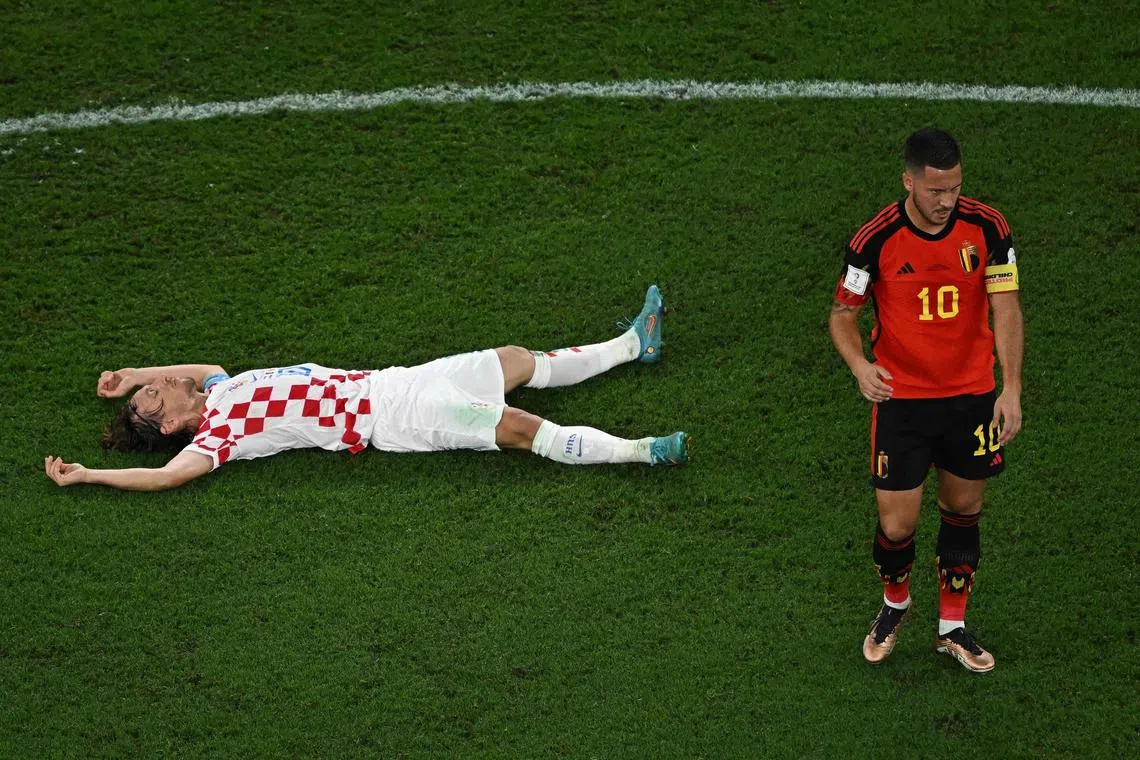World Cup: Forged by hardship and war, Croats continue to toil towards success
Sign up now: Get the biggest sports news in your inbox

Croatia's midfielde Luka Modric (left) has become a symbol of Croatia’s dogged excellence.
AFP
Follow topic:
DOHA – Luka Modric, that ageless masterful midfield operator for Croatia, collapsed on the pitch at the Ahmad Bin Ali Stadium, flat on his back, arms and legs stretched straight out. He had just been through yet another battle and came out on top, again.
The final whistle had gone seconds earlier in Croatia’s goalless draw with world No. 2 side Belgium
It requires a special type of resilience to outlast this Japanese side, who are more than willing and able to run themselves into the ground, but that is what this Croatian team has. It is an aptitude forged by strife, and one that has come to define them as a team, and as a people.
During the Croatian War of Independence in the early 1990s, horrific ethnic cleansing took place and bitter enmity was sowed between Balkan nations, who speak almost identical languages and had been part of the same country for most of a century. The war finally ended in victory for Croatia in 1995, with independence and their borders guaranteed. But not without lasting scars.
Modric, at the age of six, lost his grandfather, who was killed by Serbian rebels. He and his family were forced to flee his hometown as the war escalated. His house was burned down and he spent much of his childhood living in hotels in the coastal city of Zadar, learning to play football in a hotel carpark where he had to be mindful of landmines.
“These were tough times,” Modric later recalled.
“I remember them vividly, but it’s not something you want to think about. The war made me stronger.”
It is a robustness that has endured to this day and is one explanation how Modric, at 37, continues to perform for his club, Real Madrid, and country, which he led to the World Cup final in Russia four years ago.
It is fitting he has become a symbol of Croatia’s dogged excellence, given how sport and struggle almost have a union in the country.
The figure skater Tomislav Cizmesija earned qualification to the 1992 Winter Olympics despite not being able to train for months because the electricity at his rink was switched off during the Serbs’ bombing raids, which turned the ice into puddles.
Goran Ivanisevic, the 2001 Wimbledon champion and avid football fan – he even turned out for his hometown side Hajduk Split – was a vocal and eloquent spokesman for his nation’s desire for independence and, as a 20-year-old in 1992, told the Washington Post: “We can fight forever.”
Four years ago in Russia, their football team practically did that. All three of their knockout games that led to the final went into extra time. Two were won on penalties. In all of them, they went down first. They morphed into the football equivalent of Rocky Balboa.
After their win over Japan, centre-back Dejan Lovren said: “Maybe it is written in the stars that Croatia need to go like this. We need to suffer. Without suffering, there is no reward.”
Croatia are young as an independent nation, but their football culture as part of the former Yugoslavia goes back almost a century. The Yugoslavia team finished fourth at the World Cup in 1930 and 1962, and reached the final of the European Championship in 1960 and 1968.
This rich Yugoslav football heritage, which was marred by bans from the 1992 Euro and 1994 World Cup because of the war, meant that the first Fifa-recognised Croatia team were stacked with talent in players like Slaven Bilic, Zvonimir Boban and Davor Suker. They entered Fifa’s rankings in 1994 ranked 125th in the world and ascended to fourth within four years, when they reached the semi-finals of the 1998 World Cup.
Football became a source of pride and the sport everyone in the country plays or watches. When Croatia played England in the 2018 semi-finals, for example, store owners closed their shops an hour before kick-off because everyone would be glued to the TV. The country was at a standstill.
That will be the scene in Zagreb and elsewhere in Croatia on Friday, when Modric and his toilers take on Brazil in their quarter-final. The South Americans are in fine fettle, scoring four first-half goals in their 4-1 win over South Korea in their round of 16 game right after the Croats’ victory. But coach Zlatko Dalic is not cowed.
“This generation is a resilient generation, it does not give up and they reflect the spirit of the Croatian people who have been through so much pain,” said Dalic, who was also at the helm in 2018.
“The national team bring so much pride and joy to our people. We give them faith in a better tomorrow... I always say, do not underestimate the Croatian people.”
At the end of Friday’s game, whether those back in Croatia will witness Modric’s relief like after the Belgium game, or jubilation like after the Japan clash where he jumped into the arms of shoot-out hero – goalkeeper Dominik Livakovic – or maybe even crushing disappointment, one thing is certain – the team would have left everything they have on the pitch.
And inspire a whole new generation of Croatian warriors.


